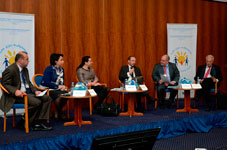
Georgia on its way to ending large institutional care for children
Thursday, November 28
The achievements of the reform are being summed up at the two day conference “Every Child has a Right to Live in a Family Environment: Taking Stock of Results and Identifying Next Steps”
TBILISI, 26-27 November, 2013. Since 2005, the Government of Georgia has made significant progress in reforming the child care system. Currently, only three state-run institutions are still functional in Georgia, compared to 41 state institutions in 2009. The number of children living in state-run institutions has been reduced from over 4,600 to 109 children. The reform has been led by the Georgian Government with the support of USAID, UNICEF and other actors.
The conference “Every Child has a Right to Live in a Family Environment: Taking Stock of Results and Identifying Next Steps” aims at reviewing the results achieved so far, analyzing lessons learned and planning the next steps of the reform. It is being organized by the Ministry of Labour, Health and Social Affairs, the Parliament of Georgia, UNICEF and USAID. The event is bringing together the key state and non-state partners, national, international experts and practitioners. Government delegations from several countries of Central and Eastern Europe and the Commonwealth of Independent States also participate into the conference.
“Georgia can be proud of its progress to eliminate the use of the state run large institutional care for children and to ensure that every child has the opportunity to grow up in a family environment,” said Sascha Graumann, UNICEF Representative in Georgia. “Instead of large-size institutions, most children are now living in a family environment and this is crucial in realizing children’s rights. Though there is a need to further enhance the social protection measures to prevent abandonment of children, strengthen alternative family-based care and support more vulnerable groups of children,” added Graumann.
Comprehensive changes have been introduced at all levels of the system and a new gate-keeping policy is being rolled-out to ensure that children come into care for the right reasons. This government policy aims to ensure that institutional care is considered as a last resort for the shortest possible time for both the state and non-state-run residential care for children. The Georgian legislation on the licensing of residential services and monitoring requirements covers all residential services but these are not yet applied to the church-run institutions.
Out of the 4,600 children who were living in state run institutions in 2008, over 2,300 children were reunited with their families, while 1,600 were placed in foster families, and 700 in small group family-type homes that house no more than 8-10 children. In 2010, the Government introduced a reunification package of US$50 per month per child for families who take back their children as well as health insurance and free day care.
At present, 1,070 children are in foster families (regular, specialized, and emergency) including 100 children with special needs. Approximately 350 boys and girls are currently living in small group/family-like homes.
Strengthening of social work has been a key component of the child care system. Since the introduction of the reunification package, social workers have supported return and ongoing monitoring of almost 1,000 children in their biological families. Social workers have been monitoring the situation of children also in foster care or small group homes.
“I would like to congratulate the Georgian Government on these achievements and thank USAID for their contribution to the reform process. UNICEF remains committed to further support the Government in strengthening the child care system in Georgia,” said Graumann.
As deinstitutionalization of children living in the large state-run institutions comes to an end, the focus of the child care reform is broadening to encompass other vulnerable groups such as child victims of violence; children living in the non-state run institutions; children living and/or working on the streets, and children in contact with law.
The US Government has invested $6 million in strengthening Georgia’s child protection system since 2009.
(UNICEF)



